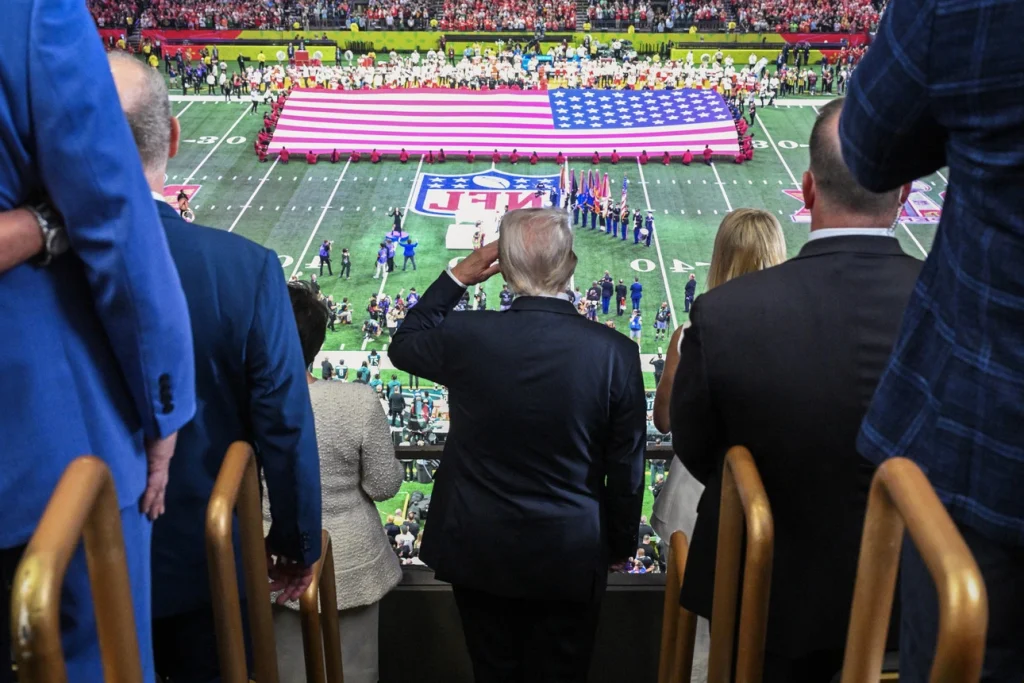
When President Donald Trump and Major League Baseball commissioner Rob Manfred met at the White House last month, they discussed one of the president’s passion projects — reinstating baseball star Pete Rose to make him eligible for the Baseball Hall of Fame. This week, that’s exactly what Manfred did.
It’s the latest example of how Trump has long tried to harness sports to flex his power and score political points, one of the most significant tools he has used to capture pop culture in ways that few politicians can rival. But his second term embrace has been different from the rocky relationship of his first, when he used clashes with the NFL and other leagues over racial protests to rile his base. Now, he is enjoying his dominance over those same leagues and using the imagery of his constant association with sports to enter American arenas and living rooms like no other president before.
Trump’s Sports Dominance in His Second Term
The longtime sports fan, who broadened his appeal on the UFC circuit and at one point owned a professional football team, has made sports a defining feature of his second term. Most of his domestic trips — other than to West Palm Beach and New Jersey to golf — have been to attend a sporting event. He has already welcomed a handful of championship teams to the White House since taking office and he even recently inserted himself into the NFL draft by advocating for top prospect Shedeur Sanders after he was passed over.
Alone, any one of these moves could be brushed off as mere pageantry, attributed to the eagerness of a president who not only loves sports but sees himself as a sportsworld figure who can use football, baseball and ultimate fighting to boost his popularity. In sum, they underscore a more serious point — that it’s not just government, but culture, that Trump is seeking to command.
Evolution of Trump’s Relationship with Sports
It’s an evolution from Trump’s relationship to sports in his first term. For decades, presidents have welcomed teams to the White House and attended games. But the sports world repeatedly denied Trump the traditional title of sports-fan-in-chief during his first term, with players and teams spurning White House championship visits amid high-profile clashes with the president over race and patriotism. Trump played his part, railing against Colin Kaepernick-inspired racial justice protests on the NFL sidelines, denouncing the league as “soft,” and sparring with NBA stars Stephen Curry and LeBron James.
Now, in a much changed cultural milieu, not only are teams embracing Trump — but the president is using his newfound power to position himself as a lodestone in the sports world, using the White House for flashy announcements.
Impact on American Culture
“It’s a massive shift from Trump 1.0. I mean, heck, think about Roger Goodell and the owner of the Washington franchise being in the Oval Office to announce the NFL draft is going to take place in D.C. in ’27,” said Clay Travis, founder of the conservative sports and politics site OutKick and a Trump supporter, referring to Trump’s May 5 announcement with the NFL commissioner.
The prominent role Trump is taking in the world of sports reflects how much American culture has shifted since the president took office eight years ago. As the so-called “resistance” worked to foil Trump, even the more conservative sports world repeatedly found itself butting heads with the president, including a notable dust-up between Trump and Goodell over players’ decisions to kneel during the national anthem — a protest led by Kaepernick, the former San Francisco 49ers quarterback — which the president derided as a “total disrespect of our heritage” and Goodell calling the Trump’s remarks “divisive.”
The Changing Landscape
But 2025 is not 2017. Gen Z men, who make up a large chunk of not only sports fans but are now professional athletes themselves, voted decisively for Trump in the 2024 election, and are aligning more Republican than they are Democrat amid a widening gender gap, according to a recent NBC poll. The poll found 45 percent of Gen Z men approve of Trump’s performance, compared to 24 percent of young women.
The sports realm’s 180 on Trump has also been bolstered by athlete-adjacent conservative media stars who match the president’s politics and personality. In the lead-up to the 2024 election, Trump joined Joe Rogan and Logan Paul’s popular podcasts — where sports and “bro talk” abound. American soccer player Christian Pulisic and UFC champion Jon Jones are among the athletes who celebrated victories by doing the “Trump dance,” the viral shimmy the president performs at his rallies set to the “YMCA.”
Future Sporting Events and Influence
And on the horizon during Trump’s second administration are two of sports most anticipated and watched spectacles: the 2028 Summer Olympic Games and the 2026 FIFA World Cup, which will both take place on American soil. This week, Qatar officially passed the World Cup hosting duties to the U.S. during a ceremony in Doha. Qatar Emir Sheikh Tamim bin Hamad Al Thani signed the ball from the 2022 cup, followed by Trump, and then FIFA President Gianni Infantino.
The World Cup tournament, which will be played in the U.S., Canada and Mexico, will be both momentous and fraught. A tournament bid that initially focused on the unity of the North American continent — a deal Trump in his first administration had a hand in — has now been marred by divisive tariffs the president has slapped on its neighbors, along with a demand that Canada become “the 51st state.”
Although the 2026 tournament and 2028 Summer Games are far off, one of the White House officials said Trump is sure to attend.











